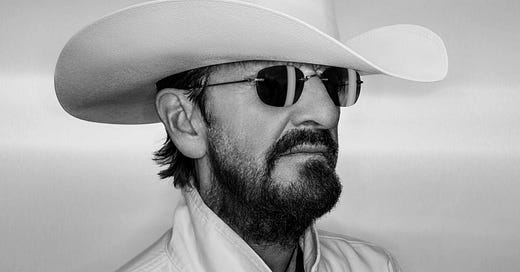Starr Time
The 84-year-old Beatles drummer rekindles his love for country & western music, with unobtrusive support from producer T Bone Burnett.
Ringo Starr - Look Up
In 2010, Willie Nelson released a T Bone Burnett-produced album called Country Music— its title a winking reference to Nelson’s proudly genre-agnostic wanderings. The joke was, it had been so long since Nelson released straight-ahead country music that he needed to announce it when he did.
The title could just as easily work for a new Burnett team-up, this one with the iconic Beatles drummer Ringo Starr. The pair’s new album is indeed country music through-and-through, an easeful continuation of the cowboy fixation that Starr first unveiled on The Fab Four’s 1965 cover of Buck Owens’ “Act Naturally.” Since then, country & western has been a regular pitstop for Starr, from the snap and twang of “Octopus Garden” through Beaucoups of Blues, a 1970 solo album cut with Nashville session players
Instead of Country Music, Starr’s Burnett team-up is named Look Up, a title that’s equally apt for the famously positive-thinking octogenarian. He, more than any other Beatle, has carried on the live-and-let-live, peace-and-love ideal of the 1960s, and his sanguine disposition provides Look Up with its bright character and countenance. Even the songs that weep over lost love— and there are several of them— are delivered with amiability and good cheer.
Burnett has a long track record of shepherding aging rock and rollers, many of them British, into tasteful Americana— see also his work as go-to producer for Elvis Costello and Robert Plant. Yet Look Up is something different, more involved; this isn’t just a production gig but a more evenly distributed collaboration, with Burnett playing guitar all over this album and writing nearly all of its songs. Only the album-closing “Thankful,” featuring harmonies from previous Burnett client Alison Krauss, bears a composer’s credit for Starr.
But if it’s wrong to say that Burnett is just the producer, it’s equally wrong to say that Starr is just the mouthpiece. Not only does his convivial croon prove to be the perfect instrument for sweetening Burnett’s tart lyrics, imbuing them with stoic everyman credibility, but the crisp pop of his drumming keeps the songs punchy and propulsive. Burnett productions can sometimes feel a bit sluggish in their analog austerity, but Starr keeps these tunes skipping along with the same briskness and bounce he brought to, well, “Act Naturally.”
Burnett rises to the occasion with warm, largely acoustic arrangements, many of them graced by honeyed background singers— or, in the case of Molly Tuttle’s turn on “Can You Hear My Call,” a full-on Opry-style, call-and-response duet. And he textures these songs with just the right level of detail— wispy strings and pedal steel cradling “Time on My Hands,” jaunty barroom piano on “You Want Some,” rackety blues guitar grinding through “Rosetta.”
Still, when the album really feels magical, it tends to be the byproduct of Burnett and Starr’s collaboration. Nowhere is this clearer than on “Come Back,” a song imported from Burnett’s recent solo album The Other Side. The arrangement presented here is largely similar— and yet the addition of Starr’s high-and-lonesome cowboy whistle fundamentally changes the character of the song, imbuing it with new warmth and playfulness.
Those same qualities pervade Burnett’s lyrics, most of which are so well-suited to Starr’s voice, you might assume they were his own compositions. In “String Theory,” the words gesture toward quantum mechanics as a way of proving Starr’s original thesis— the love you take is the love you make, and all you need is love.
Meanwhile, the title song is a call toward positive thinking, invoking Sister Rosetta Tharpe as a patron saint and guiding light. She’s not the only roots music trailblazer whose spirit is summoned: Opener “Breathless,” featuring dexterous support from Billy Strings, shares a title with an old Jerry Lee Lewis number, and is nearly as ebullient in its lovestruck declaration.
Starr’s sunny disposition doesn’t always land— his autobiographical “Thankful” almost collapses into mush— but in general it feels apt for an album that certainly isn’t contemporary county, but doesn’t feel self-consciously old-fashioned, either; instead it celebrates the genre’s balancing act between truth-telling and theatricality, combining direct emotions and simple sentiments with a playful, cowboy swagger. It’s the kind of thing Starr has always been good at, and it’s a joy to hear him sound so comfortable in his own skin.
My rating: 7 out of 10.
You might also like:





